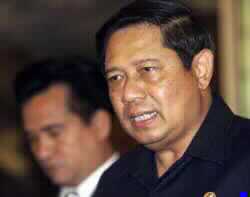Indonesian President Signs Emergency Anti-terror Decrees
19/10/2002| IslamWeb
 HIGHLIGHTS: Death Penalty Extended against any Person Found to Be Using Violence or Threat of Violence to Create Terror or Unrest amongst the Masses||Australian Prime Minister, Howard, Pleased with Indonesian Response||International Police Say they Have a View as to Who is Behind the Bali Blast||Spiritual Leader of Mujahidin Council Indonesia-MMI Summond to Jakarta for Questioning But is Reported Sick||U.S., Britain & Australia Advise Citizens to Leave Indonesia|| STORY: Indonesia's president signed emergency legislation late on Friday giving authorities wide powers to combat terrorism and investigate the deadly Bali bombings that killed nearly 200 people.
HIGHLIGHTS: Death Penalty Extended against any Person Found to Be Using Violence or Threat of Violence to Create Terror or Unrest amongst the Masses||Australian Prime Minister, Howard, Pleased with Indonesian Response||International Police Say they Have a View as to Who is Behind the Bali Blast||Spiritual Leader of Mujahidin Council Indonesia-MMI Summond to Jakarta for Questioning But is Reported Sick||U.S., Britain & Australia Advise Citizens to Leave Indonesia|| STORY: Indonesia's president signed emergency legislation late on Friday giving authorities wide powers to combat terrorism and investigate the deadly Bali bombings that killed nearly 200 people.
Indonesian police were waiting to question a Muslim religious leader said by neighbouring countries and Western intelligence agencies to be a key player in terrorism in the region. An aide said the religious leader was sick and might not show up.
"Police can detain anyone strongly suspected of acts of terrorism based on initial evidence for as long as seven days," the document said.
"Any person found intentionally using violence or a threat of violence that would create terror or unrest among the masses faces the death penalty," it added.
MILITANT ISLAMIC NETWORK
No one has claimed responsibility for the nightclub blasts but some have pointed the finger at Jemaah Islamiah, a militant Islamic network linked to al Qaeda, which regional intelligence officials say has plotted acts of terror throughout Southeast Asia.
Before the signing of the legislation, Australian Prime Minister John Howard said he was pleased with the Indonesian response to the bombing in the coastal resort of Kuta which is thought to have killed more than 100 of his compatriots.
In Bali, 95 law enforcement personnel from seven countries are working on the investigation which is being jointly run by Indonesia and Australia and has been dubbed Operation Alliance, Australia's chief police investigator in the case said.
Federal agent Graham Ashton said international police would travel across the vast Indonesian archipelago if need be to conduct the probe. "We are getting significant information in, we do have a view (on who is behind the blast), but we are not prepared to say," Ashton told a joint news conference with the Indonesian police.
SUMMONED FOR QUESTIONING
Police said Abu Bakar Bashir, the religious leader foreign intelligence officials believe is a leader in the Jemaah Islamiah network, had been summoned for questioning on Saturday but police and his lawyer said this was not over the Bali bombs.
Bashir's lawyer Mahendradatta told Reuters police documents showed his client was a suspect in a bomb attack in 2000. "I underline this has nothing to do with the Bali blast. There is no connection with the Bali bombing," he added.
Bashir has denied any terrorist links and says he has no knowledge of Jemaah Islamiah.
Irfan Awwas, executive chairman of the Mujahidin Council Indonesia-MMI of which Bashir is spiritual leader, told Reuters Bashir was sick and had been taken by ambulance to a hospital in his home city of Solo.
Photos showed Bashir on a stretcher with a breathing tube in his nose and a doctor said he would not be able to leave the hospital for at least two days.
Police spokesman Saleh Saaf said he would wait to see whether Bashir shows up as scheduled at 10 a.m. (0300 GMT) on Saturday before saying what action police might take.
One Western diplomat told reporters he doubted Bashir's sickness would seriously delay proceedings. "My sense is the government very much feels the weight of public opinion in the world and in Indonesia on it right now," he said.
Police said Bashir, who is not being summoned under the emergency decrees, was a suspect because of statements from a self-confessed member of Osama bin Laden's al Qaeda network, Omar al-Faruq.
Bashir has denied all links with terrorism or the Bali atrocity.
Al-Faruq is reported to have outlined extensive terrorist plans and activities he was involved in or knew about in Indonesia and Southeast Asia in recent years.
Many Asia-Pacific nations are moving towards listing Jemaah Islamiah as a terrorist organisation, a senior U.S. official said on Friday. Such a move would put even more heat on Indonesia to take action against those linked to the group.
As investigators hunted for clues that might link radical Islamic groups to the Bali attacks, the United States, Britain and Australia advised their citizens to consider leaving Indonesia and began evacuating non-essential embassy staff and family members
PHOTO CAPTION
Indonesian Chief Security Minister Susilo Bambang Yudhoyono (R) and Justice Minister Yusril Ihza Mahendra hold a news conference announcing new anti-terrorism decrees signed by the President Megawati Sukarnoputri in Jakarta on October 18. REUTERS/Sup
www.islamweb.net
